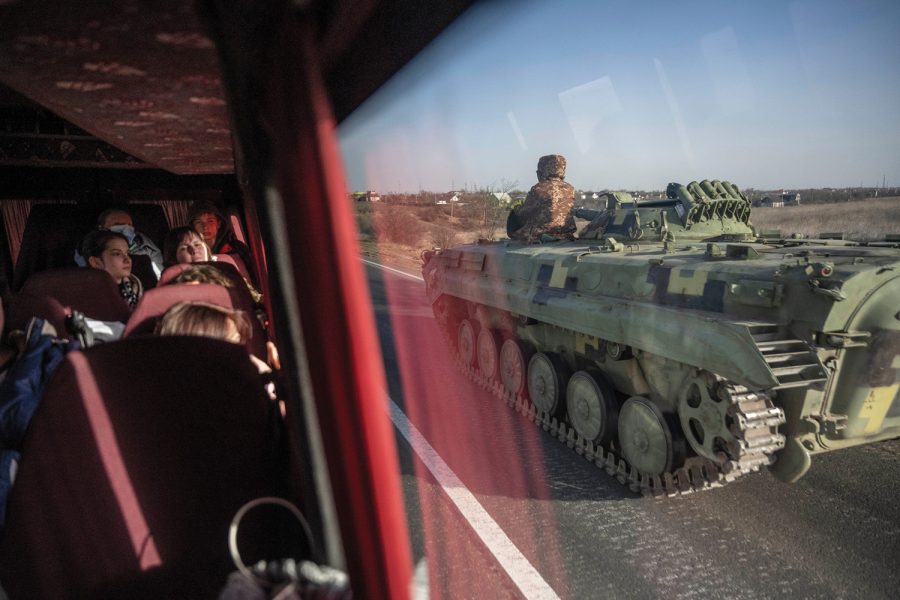UI Tippie College of Business extends non-residential fellowship to Ukrainian scholar
The Non-Residential Fellowship connects Ukrainian scholars with international universities to provide financial support along with academic exposure.
MICHAEL G. SEAMANS, FOR USA TODAY
Ukrainian military forces are seen going in the opposite direction through the bus windows of Team Humanity as they evacuate soon-to-be war refugees to Moldova as they leave the war sieged city of Mykolaiv, Ukraine as on Sunday, March 27, 2022.
March 19, 2023
Volodymyr Vakhitov, a Kyiv resident and academic researching the behavioral psychology behind evacuations, will give two virtual talks to amplify and receive feedback about his research he conducted while he’s been in Ukraine. Vakhitov’s second talk is scheduled for April.
He is working with the UI through the organization Economists for Ukraine, which is a non-residential fellowship program designed to help scholars who decided to stay in Ukraine, according to its website.
Vakhitov’s research focuses on people’s behavior, with an emphasis on why people may hesitate to evacuate.
“People didn’t want to evacuate, and I thought that this was a behavioral problem,” Vakhitov said. “So, we basically got some personal files of two researchers, got them together, and some company in Ukraine, which provided this service, collected about 2,000 observations from a questionnaire in the experiment.”
The war in Ukraine started in February 2022 after Russian President Vladimir Putin ordered an invasion. Russia still classifies the Ukraine invasion as a special military operation after a year of fighting.
The questionnaire, sent out to participants after Russia’s invasion of Ukraine, asked if participants had an evacuation plan, concerns about evacuation, a mode of transportation, assistance in evacuating, and if they had kids or elders to worry about helping evacuate, Vakhitov said.
“It looks like those people who were prepared, they literally evacuated much more often, and they answered our questions about evacuations also with bigger certainty,” he said.
Vakhitov emphasized that given the nature of the situation that prompts evacuation — shelling, blasts, explosions from jets flying overhead — the resulting stress level prevents people from thinking straight.
People often need clearer instructions on what to do beyond “You need to evacuate,” Vakhitov said, because people didn’t know where to go.
Vakhitov said he was able to evacuate at the start of the war because his friends offered to let him stay in their large apartment or to help him find his own place.
“I think what saved so many people during the first days of war is this horizontal linkage between people,” he said. “Even sometimes I didn’t know those people, I would just help them because I felt that it was important.”
The fact that Vakhitov had access to a car, he said, was also helpful.
Access to housing, transportation, and information during an evacuation, he said, helps decrease uncertainty for people.
“Whenever we managed to decrease uncertainty about the nearest future, about tomorrow, people are more likely to move and to make correct moves,” he said.
Petra Sinagl, Tippie College of Business assistant professor of finance from the Czech Republic, said she wanted to get involved with economists for Ukraine because of her background.
“We have a very bad experience with Russian occupation and actually, pretty much the same thing, except for the war happened to us in 1968 where Russians came with tanks, we just let them seize us,” Sinagl said. “It has a very special kind of feeling what is happening to Ukrainians, so I’m trying to help the way I can from here.”
Sinagl said she reached out to Tatyana Deryugina, a member of Economists for Ukraine’s leadership team, to get involved with the organization and learn how to implement the fellowship at the UI.
At the UI Tippie College of Business, Sinagl said the main criteria for their consideration of fellows consisted of mutual research interests in addition to English-speaking ability to allow for communication.
Once she received information from Deryugina, Sinagl said she started conversations with Tippie professor Kenneth Brown on implementing the fellowship at Tippie.
Brown said during the planning and creation of advertisements for Vakhitov’s talks, which included a clip art image of a circle with tanks, planes, and missiles, there was consideration about how to be thoughtful, respectful, and genuine about the reality in Ukraine.
“Are we trivializing the invasion of their country to a major world power by using clip art by having it be a hook in an article?” Brown said. “I don’t have an answer.”
Brown said, despite these worries about trivialization, he does think what the UI is doing is meaningful with this non-residential fellowship.
“I think that is an important lens to think about this, and the way that I’ve thought about this is it’s important for us to be concerned about world events, even when there’s not a war,” he said.















